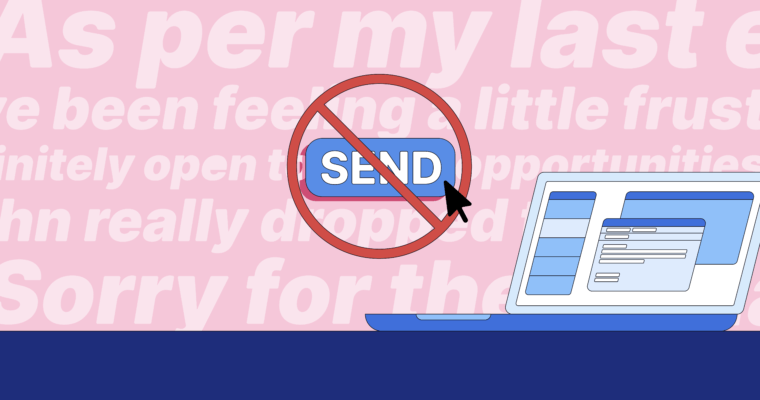
There are some things you already know not to mention via email; political opinions, anything that could be considered sexual harassment, and office gossip are among the no-brainers. But there are also some less obvious topics and phrases you’d do well to stay away from, particularly if you want to come off as professional, competent, and on top of your workload. After all, emails can stick around for a long time, and you never know what might get dug up down the road.
Here’s what HR pros say you should avoid at all costs.
1 “Just a heads up, I’m calling in sick tomorrow.”
Look, everyone has called in sick for a pre-planned mental health or personal day at some point in their career, but that doesn’t mean you should talk about it over work email. “Emailing your plans to play hooky the next day isn’t the smartest of moves,” notes Patrick Colvin, Strategic HR Business Partner for USA Today. “This simply puts your dishonesty on display for everyone to see if your message lands in the wrong hands.” While your boss might understand if you explained your need for a day off in person, having it in written form feels decidedly sneaky. “Unless you are genuinely sick and have a feeling you won’t be in the next day, this is not a message you want out there,” Colvin adds.
READ: 5 Better Alternatives to “I Hope This Email Finds You Well”
2 “John really dropped the ball on this one.”
“Never discuss a co-worker’s performance, unless you are their boss and are discussing it with HR or your boss,” advises Cam Bishop, President and CEO of SkillPath. “Not only is it rude, but it’s not your place to discuss someone else’s performance over email.”
? We teamed up with @Grammarly to bring you all the expert info you need to write a stellar résumé. Read our free eBook here: https://t.co/bnXGU4aGDS #résumé #jobsearch pic.twitter.com/MYC86mSEe1
— Glassdoor (@Glassdoor) July 5, 2018
3 “I’m feeling…”
It’s best to keep anything emotional out of work emails, says Ginger Robitaille, Professional of Human Resources, HR Generalist at Turning the Corner. “It is important for email communications to be based on facts, sharing information that is required, but not emotional. Our emotions can be construed many different ways when there is no tone or voice inflection to go along with the words,” she says. And if you can’t keep your emotions out of the content of an email, that’s a conversation you should probably be having in person or over the phone.
READ: 11 Unique Ways to Say “Thank You” in an Email
4 “Does Tuesday still work for you to return those documents to me, maybe around 3PM? No worries if not.”
Tentative language has no place in email, according to Amanda B. Gulino, HR expert and founder of A Better Monday. Instead, go for something like: “Have you had a chance to review the documents I sent over last week? Please review and return them to me by Tuesday at 3PM so we can stay on track with our project plan.” By communicating assertively and clearly in work emails, you’ll project confidence and competence.
5 “Here’s a copy of the project I’m working on with my team. I’d love to get your feedback.”
“Unless your boss says it is okay to share a project, keep it to yourself or specific team members working on your assignment,” says Jill Tipograph, co-founder of Early Stage Careers. Inadvertently sharing confidential or proprietary information from your company might seem like an innocent mistake, but it can be grounds for dismissal from your job. “Millennials in particular like to crowdsource topics, even decisions,” Tipograph points out.” But asking your friend who is also in consulting how to solve a client problem, for example, is not permissible.”
6 “This place really gets me down sometimes.”
Even if you’re writing to your best friend in the office after a really difficult day, you should never say anything negative about your workplace via work email. “A message to your co-workers about how much you despise the work you do can easily make its way to your manager,” notes Tiffany Kuehl, Senior Human Resources Recruiter for Versique. “In a best-case scenario, your manager schedules a meeting to talk to you about your concerns. In a worst-case scenario, you’ve just emailed yourself right out of a job.”
READ: 7 Clever Ways to Say “I Look Forward to Hearing from You”
7 “Apologies for the delay.”
“It’s important to take responsibility and apologize from time to time, but some of us do it way too often,” says Alayna Frankenberry, Manager of Inbound Marketing for BlueSky ETO. “Women especially have been socialized to apologize, defer, and buffer their statements with phrases like, ‘Let me know if you disagree,’ and ‘This is just my opinion, but . . .’ Constantly apologizing and qualifying your statements like this waters down your voice and can lead to a lack of respect from colleagues. No matter your gender, if you find yourself overusing these phrases, challenge yourself to take a more direct and concise approach.”
8 “Nice work. Next time, please consider . . .”
It may seem easier to give constructive criticism via email, but it often backfires. “Pick up the phone, find time to meet in person, or speak via video conference,” Gulino says. “The intent of the message is almost always different than the impact of the message, meaning that what you intend to say is going to reach your audience differently, and likely negatively. I’ve never seen constructive feedback given over email taken well. On the contrary, it has created a whole host of new problems, including lack of trust.” And if you have to give some feedback over email, keep it to the positive, she says.
We think your writing is beautiful.
That’s why we created the New Grammarly Editor—to match our users’ fantastic writing.
Have you tried it yet? #cleanwritinghttps://t.co/GxkYT3RONA
— Grammarly (@Grammarly) May 21, 2018
9 “I’m open to other opportunities.”
This is truly one of the worst things you can say over work email, and yet people do it all the time. “Don’t tell people you are looking for a job or that you may know of someone looking to leave,” Tipograph recommends. Talking to recruiters, checking in with clients and competitors about open roles, and chatting with co-workers about what’s next for you job-wise are all no-nos. “Even if you are thinking about it, it’s not news to announce,.” she says.
10 “As per my last email . . .”
This sentiment comes in many forms including “as already noted below . . .” and “as previously discussed . . .” All iterations should be avoided. “The not-so-gentle nudge is becoming more common over professional email, and looks anything but,” says Jon Brodsky, Country Manager for Finder.com. “It’s passive aggressive and a very thinly-veiled attempt at passing blame for a project that has stalled.” Instead, just repeat whatever needs to be repeated and move forward.
A version of this post originally appeared on Glassdoor’s blog.
More from Glassdoor:
3 Job Search Mistakes To Quit Making Today
The Best Job Search Advice from Top CEOs at GM, 23andMe, Hilton & More
![]()





